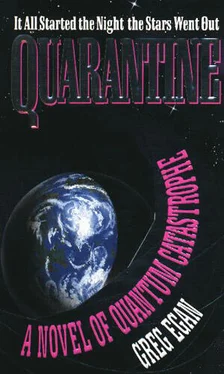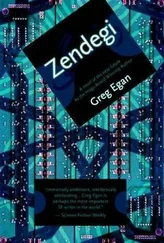Then again, perhaps the criterion in all cases is simply my belief that the outcome is correct; the state is chosen only because it contains a version of me who thinks he's been successful… and if one of my virtual selves were to suffer a lapse of concentration and mistakenly believe that a five and a three had summed to a prime, he might end up being rewarded for his incompetence with the privilege of becoming real. (Maybe that's already happened. Several times.
Maybe I'm slowly but steadily 'mutating' towards an increased capacity for inattentiveness and self-delusion. If this kind of 'evolution' could give Laura the brain pathways upon which Ensemble itself is based, I shouldn't underestimate the effects it might have on me.) I could buy a pocket HV camera and start recording everything — replaying it only after collapsing — but I'm reluctant to smuggle in too much incriminating hardware. If I'm caught simply throwing dice, that could be passed off as an innocent enough amusement; I could claim that P3was malfunctioning again, requiring some diversion to keep me sane through the early hours of the morning. I doubt that this explanation would stretch to making home movies on duty.
As the experiment proceeds, my resolve often wavers, but it never quite fails. This is what the true Ensemble requires of me; I'm certain of that. And if smearing is the antithesis of everything I stand for, everything I've spent my life trying to achieve — control over who I am and who I can become — then surely the perfect control that Ensemble grants me more than compensates for the risks … so long as it's me who's in control, however indirectly. So long as my wishes continue to hold sway when I smear.
At times, I still catch myself thinking: If I don't know how to invoke Ensemble, who does? Which of my shortlived virtual accomplices learns the trick … and, having done so, why does he let himself die in the collapse? Why does he strengthen an eigenstate other than his own, when he could use the mod to make himself real?
But the more I think about it, the more convinced I am that Po-kwai's view must be correct: my entire smeared self operates Ensemble, and there is no single version of me who possesses the skill. Whoever the collapse made real would mimic my protestations of ignorance. The knowledge must be distributed, like the knowledge in a neural net. No single neuron in my brain embodies any of my skills — so why should I expect any version of me to hold the secrets of my smeared self? And whether the smeared Nick Stavrianos rediscovers the skill anew each time he comes into being, or whether the knowledge survives the collapse, encoded in some 'hologram' in my brain, there are no virtual martyrs, no self-sacrificing alter egos who use the mod to give me what I want, at the cost of their own existence.
And my smeared self? He's no martyr; he has no choice. One way or another, he must always end up collapsed.
Which is not to assume that he must always end up collapsed as me.
Just when the whole business is beginning to seem almost mundane (I want totals of seven… I get totals of seven … what could be simpler than that?), Lui hands me a wad of sealed envelopes.
'These are lists of one hundred random outcomes. You might try making the dice produce them.'
'You mean, read through the list as the dice are thrown?'
He shakes his head. 'What would be the point of that? Consult the list after collecting the data — but before you collapse, of course.'
I baulk at this, instinctively — and fail, four nights running. And the truth is, I'm glad to fail: defiantly, blasphemously, self-righteously fucking joyful — as if my failure implied some kind of reprieve for all the discredited, 'reasonable' explanations that I thought I'd stopped clinging to long ago. How can I make the outcomes match, when I don't even know what they are? Of course I'm failing! It's just not possible.
At the same time, I know full well that this task is nothing special, nothing new. It no more requires 'clairvoyance' than the other experiments required 'telekinesis'. It's just a matter of choosing the right eigenstate: of making the right present become the past.
On the fifth night, as before, I note the results in a MindTools scratchpad, then pull an envelope from my pocket at random and tear it open. After the first three matches, I'm sure that the other ninety-seven will agree, but I diligently check them one by one.
I don't feel the least bit disoriented — or resentful — until after I've ticked the OFF switch and collapsed. But then, given the choice, why would I?
Lui gives me a combination padlock and suggests casually, 'Why not open this on the first try?'
'By throwing dice?'
'No. On your own.'
'Using von Neumann?'
'No. By guessing.'
I sit in the anteroom, waiting for Po-kwai to fall asleep. I wonder what she dreams about when I borrow the mod; nothing at all, if my smeared self chooses her state correctly … but without waking her and asking her (before collapsing), on what basis does he make that choice?
Maybe versions of me do wake her and ask her.
I deprime, smear, then wait five minutes. I want to be sure that I'll end up 'sufficiently smeared' to operate Ensemble — and it's far less off-putting to go through all the waiting now, before even attempting the task, than to leave it until I've succeeded — and find myself confronting the fact that I have no choice: I can't, I won't, collapse too soon.
The whole question of the timing of the collapse still unsettles me. Po-kwai has it easy; she's given no choice. In my case, there must be eigenstates in which I choose to collapse earlier, or later, than I do in the state that's finally made real. These attempts are inconsequential, of course; the collapse is only real if it makes itself real. That sounds uncomfortably circular, but at least it's consistent: the entire wave collapses precisely when the chosen state includes the action which brings that about. Or rather, it's consistent from the point of view of the version who becomes real — but what about the versions who attempt to collapse, and fail? Do they know that they've failed — and what that means? Or are they just mathematical abstractions who know nothing, feel nothing, experience nothing?
I take the padlock from my pocket and stare at it with increasing unease. People are notoriously bad at inventing truly random numbers; I wish I'd decided — before smearing — to ignore Lui, and use the dice. What if the combination is 9999999999? Or 0123456789? I have no doubt that it's physically possible for me to hit the keys in any order whatsoever — but am I psychologically capable of 'guessing' such a 'non-random' sequence?
Well, I'd better be. Because if I'm not, I'm sure my smeared self — with the help of Ensemble — can find someone else who is.
I laugh that off. Change equals suicide? That's Po-Kwai's line, not mine. Besides, surely it's too late for such qualms; if nothing's real until the collapse, then surely I've 'already' collapsed. This whole experience has already been selected — and I've already become whoever I have to become in order to open the lock. And it doesn't feel like much of a change to me.
But as I move my index finger towards the keypad, I suffer a sudden shift of perspective:
I'm one of at least ten billion people, sitting in at least ten billion rooms, confronting at least ten billion locks. If I guess the correct combination, I live. If not, I die. It's as simple as that.
What makes me think that I have 'already' succeeded? The fact that the room looks normal? The fact that I'm experiencing anything at all? If the collapse doesn't manufacture experience — if it merely selects it — then why should the perceptions of any one version of me be radically different from the others? Why should the state that happens to become real be the only one that seems real?
Читать дальше










